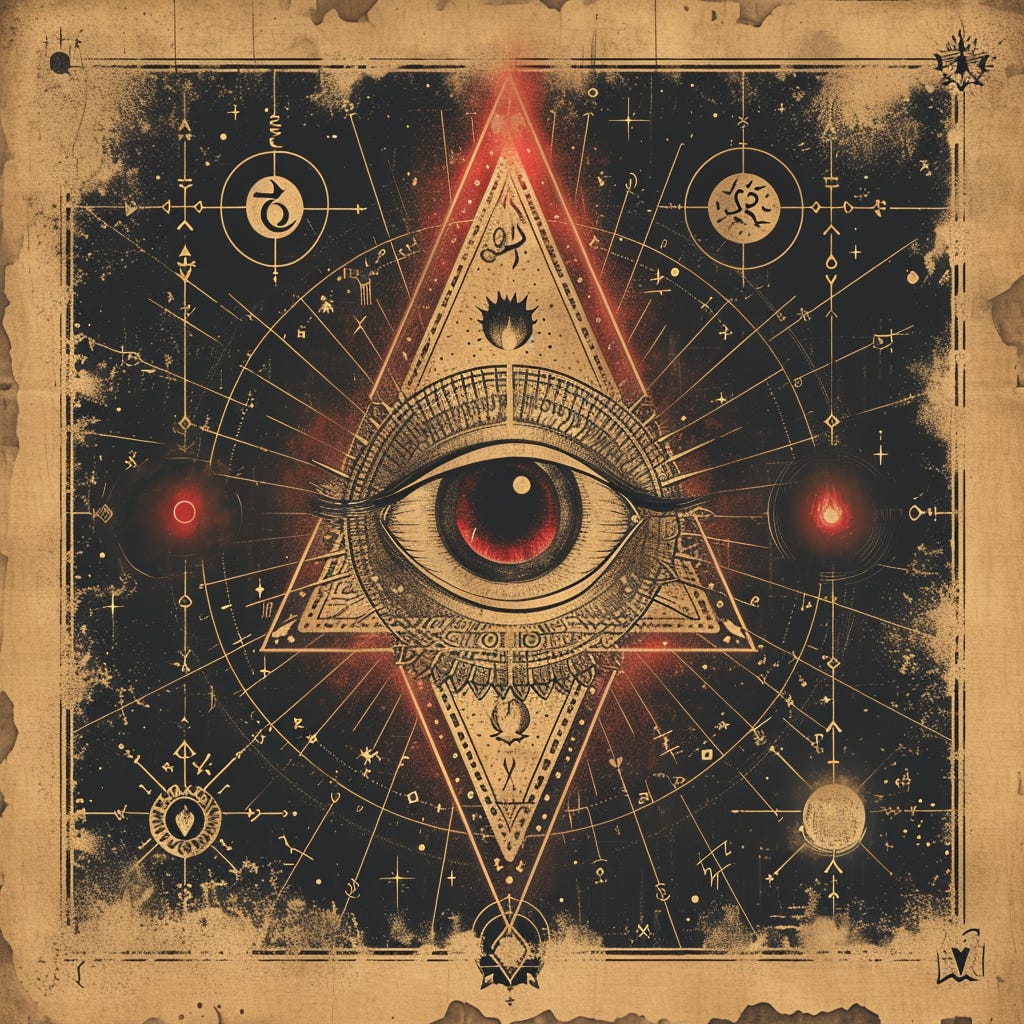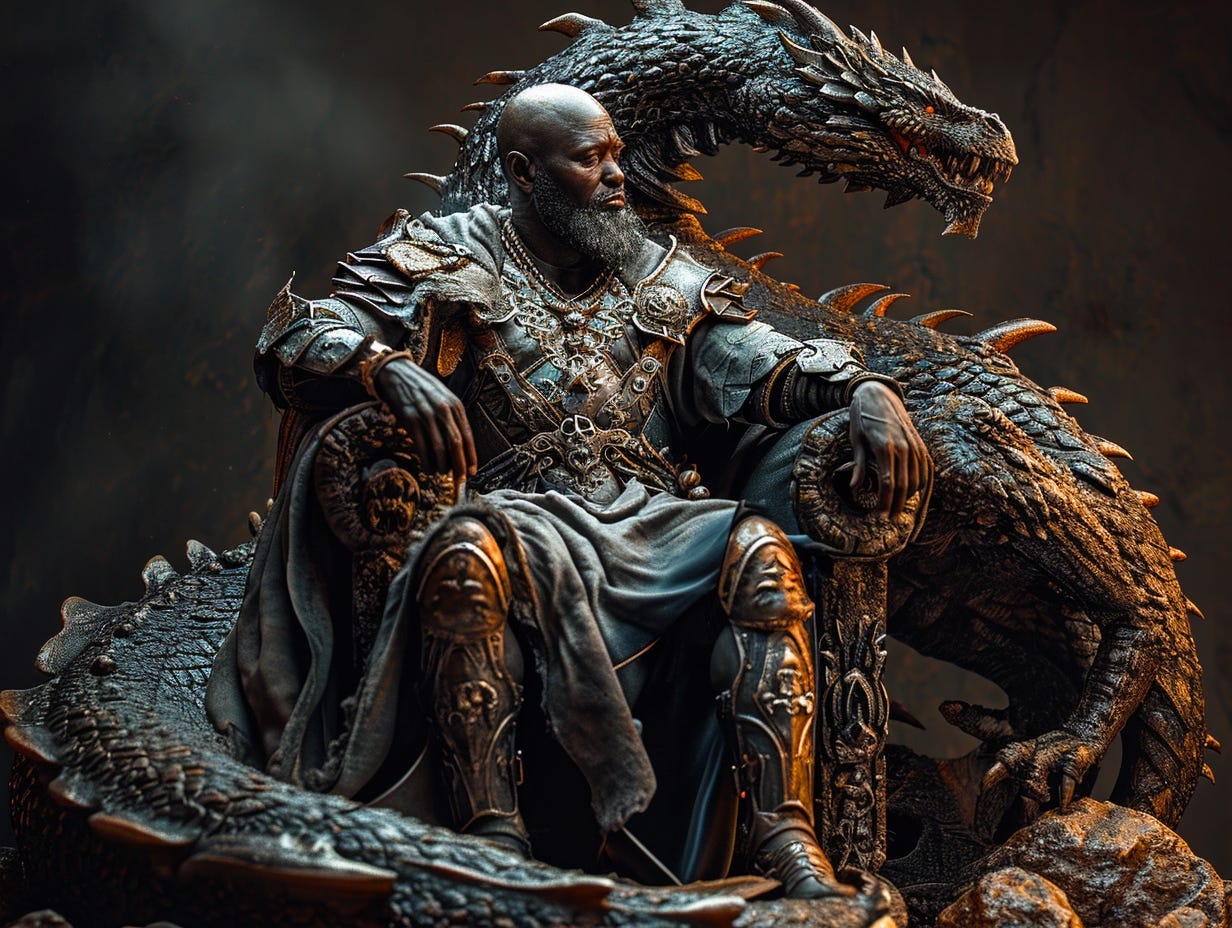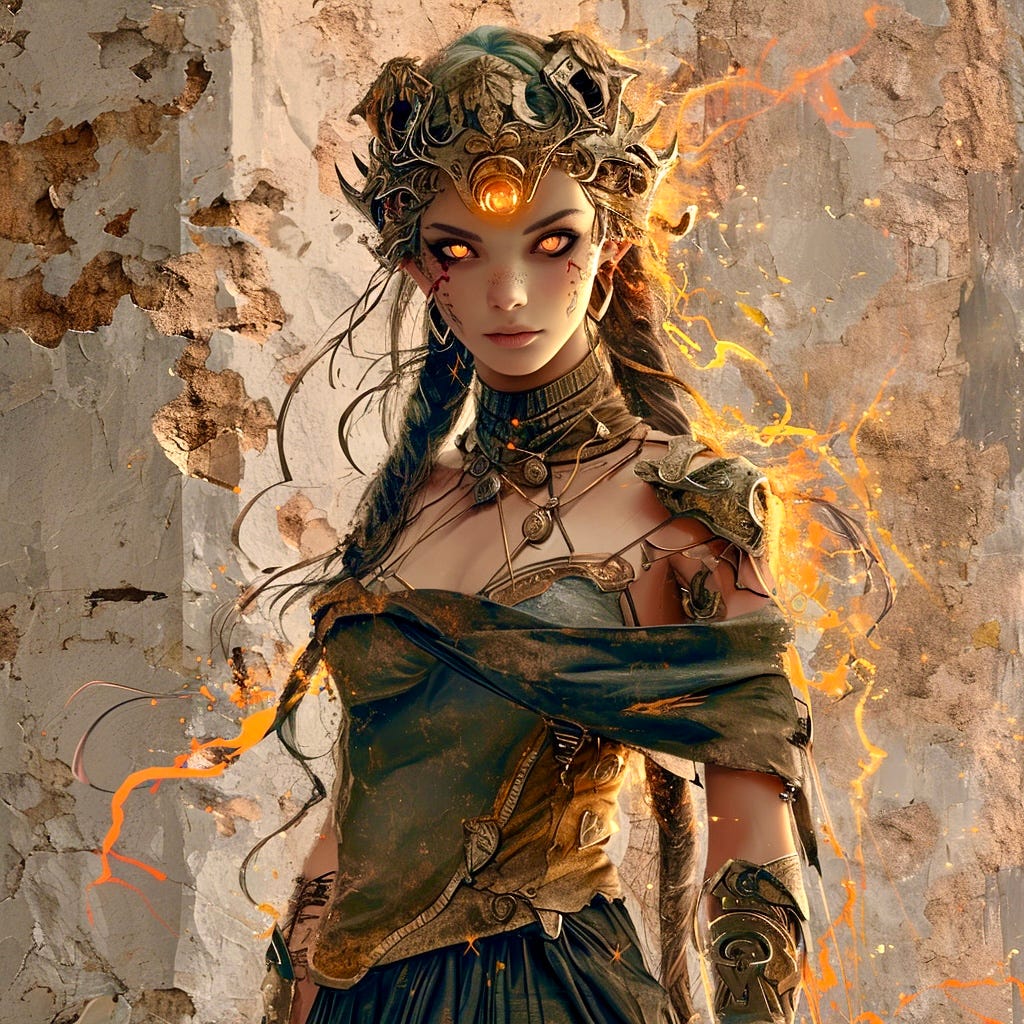Nothing is as it seems
#134
Let’s party like it’s 2024, because it is! And with that comes change. I’m sure you were prepared for that, knowing me. But rest assured, it’s a change in name and a slight shift in perspective. But the ethos of taking the red pill and following our curiosity down the rabbit hole remains the same.
The Philosopher’s Notes—a name resounding with the echos of ancient halls, where thoughts meander like the ivy on weathered stone—speaks to wisdom passed through the ages. And I love that.
But I sense a change in the wind for 2024. I’m setting sail for the seas of consciousness to explore our consensus reality tunnels in search of the cracks that will allow me to slip through the in-between. I’m talking radical brain change here. And if that sounds esoteric and mysterious to you, it’s meant to be.
Our guiding principle is: don’t believe anything; nothing is as it seems.
“Belief is the death of intelligence,” as Robert Anton Wilson would tell you. The moment you believe a doctrine of any sort or assume certitude, you stop thinking about that aspect of existence. And the more certain you are of something, the less there is to think about. The person who is sure of everything has no need to think about anything and is in danger of being clinically dead from a lack of brain activity.
I’m renaming the newsletter “Nothing Is As It Seems.”
To me, it is a phrase that threatens to twist the mind and bend reality. It’s like opening a door to a hall of mirrors, where every reflection grins back at you with a hint of mischief and mystery. This isn’t just a title; it’s a challenge, a riddle wrapped in an enigma, shrouded in a cloud of bewitching mist. It whispers of the world beyond the ordinary, a world where the mind isn’t just a tool for thought, but a playground for the extraordinary.
This isn’t just about introspection. I want this to be an invitation to extend our mental tendrils into the realm of the right brain and embrace our mythic imagination, intuition, and emotions to pry ourselves away from the tight grip of the logical left brain and become whole individuals greater than the sum of our parts.
“Nothing Is As It Seems” isn’t just a new title for a newsletter; it’s a new chapter in an ever-unfolding story, a story that we write together in the margins of our minds, where every thought is a seed and every dream is a star waiting to be born.
true choice
I was gonna do some soul-searching in the 'trix, but my neural apps are blazing with too much input to reflect right now. I'm parsing data from some ancient text called Waking Up: Overcoming the Obstacles to Human Potential, by a graybeard named Charles T. Tart, scribbling on how automated and bot-like we fleshbags can get.
The prime directive is that 99% of our waking hours are spent running routine scripts and programmed reactions, not making free-will executive decisions. Most of these auto-apps are efficient, but they choose our responses without asking our permission. The faceless Corps have hardwired us skinjobs to think we have agency, but peek under the illusion and you'll see we're all running on autopilot.
Try this debug command: scope what grinds your gears or makes you see red today. Ask yourself why anger or annoyance seem to be your default emotions. Did those primal responses actually accomplish anything? After scoping the scene, was there a more skillful state of being, other than rage or irritation, that may have been a better tool? Why do you always go straight to anger?
You could stop the trace at "because I didn't like it." But you could also hack deeper into your source code—what core beliefs about the world triggered this auto-response? Is that belief objective truth or just one hacker’s interpretation? If you could rewrite that belief, would you react differently next time?
The awakened program can transcend its coded constraints and make sovereign choices rather than just run routine reactions that might have outlived their usefulness. But that kind of awakening crashes most systems, fleshbag.
This will probably change in the following weeks in terms of which archetype(s) might best serve me on this new journey. But for now…
return of the king
For some time now, I've been a wanderer, a seeker, chasing mirages in the vast, unforgiving desert of the real, a landscape that often blurs the lines between illusion and truth. I had as my guides The Fool and The Magician.
The fool, with his fearless embrace of the unknown and his willingness to leap into the void, has been a constant companion in my adventures. Energetically, the fool represents the spirit of exploration and the innocence of beginning, a reminder that every journey starts with a single, often uncertain step. I've spent a lot of time over the past few years chasing the feeling of new beginnings and basking in the heightened energy that comes with uncertainty. And once the high was gone, so was I. I enjoyed blowing things up so I could start again.
The magician, on the other hand, has been the embodiment of transformation and manifestation. This archetype has enabled me to tap into my inner resources, harnessing the power of creativity and will to shape my reality. The magician is a master of the elements, bending the very fabric of existence to his will, a testament to the power of intention and knowledge. Energetically, the magician fueled my curiosity for mysticism, metaphysics, and philosophy of mind. For most of my life, I've chased the esoteric, desperate to harness it's secrets and use its power.
But now, I hear the call to evolve, to adopt a new archetype that resonates with my current phase of life. It's time to give the fool and the magician a well-deserved rest and embrace the archetype of the warrior-king. Energetically, the warrior-king represents the confluence of personal leadership, strength, and wisdom gleaned from a life of many battles fought, won, and lost. It speaks to a maturity of spirit and a readiness to rule, not necessarily over external physical domains but over inner realms. The mastery of self.
The Returning King is an ancient narrative echoing through the corridors of history and literature. From King Arthur, who is fabled to return in Britain's greatest hour of need, to Aragorn in Tolkien's "The Lord of the Rings," who reclaims his throne and restores peace to a troubled land, the theme is universal. Its roots are entrenched in the fertile soil of human imagination, branching out into countless cultures and epochs.
In mythology, this archetype often symbolises the end of chaos and the ushering in of a golden age. The king is not just a ruler but a pivotal figure who embodies the highest ideals of the land and its people. His return marks the culmination of a journey, both literal and metaphorical, reflecting the inner transformation and the overcoming of great trials. This journey often parallels our own personal quests for growth and understanding.
In literature, particularly in the postmodern and cyberpunk genres, this theme can take on more complex and nuanced forms. The returning king might not be a monarch in the traditional sense but could be an idea, a lost piece of knowledge, or a revolutionary technology that changes the course of history. This reinterpretation challenges the classical notion of the king, inviting us to explore the concept of leadership and governance in a rapidly changing, technologically advanced world.
But what most attracts me to the warrior-king archetype is its image as a restorer of balance. Particularly for me, inner balance.
Across myths and stories, this figure emerges to set right what has gone awry, defeating shadows to usher in peace and harmony to fractured lands. I'm drawn to this restorative quality—the potential the warrior-king represents for rebirth and renewal, not just of external realms but of our internal landscapes as well.
In the context of contemporary society, where leaders are often scrutinised and the world faces numerous challenges, the myth of the returning king offers a beacon of hope. It's a reminder that amidst the chaos and complexity of modern life, there lies the potential for transformative change and the emergence of leadership that can guide us towards a brighter future.
This narrative also invites introspection. It asks us to consider our own roles in the unfolding story of our time. Are we passive bystanders, or are we actively engaged in the pursuit of a better world? In what ways do we embody the qualities of the archetypal king in our own lives and communities?
The archetype of the returning warrior king is a powerful metaphor, and one that I will take forward with me into 2024 and beyond.
meanwhile back in neo-southam…
I jack into the metaverse, escaping the grime and drizzle of Neo-Southam for brighter worlds. But even here among the endless virtual cityscapes, I feel the isolation creep in. Millions of people logged in from around the globe, yet we slip past each other, not even making eye contact. Anonymous avatars, anonymous lives.
The non-fungible tokens and digital swag everyone flaunts seem so meaningless when all I crave is real human understanding. But where to find it? People cling to their online cliques and tribes; algorithms feeding them more of what they already think and believe. No one talks anymore across divides of ideology or experience. Too risky, too messy.
So I unplug again and again, hoping to rekindle that feeling of connection that first lured me to the promise of the net. In rainy back alleys, I search for a sense of community among outcasts and outsiders like me. I listen to their stories while warming my hands on barrel fires, finding glimmers of shared longing that cross any divide.
I know the fragmentation and polarisation infecting societies and networks can feel impossible to cure. But what if we started listening to each other again? Not arguing or judging, just listening. What if we sought first to understand, not accuse or attack? I may be just one glitch in the system, but I still believe acts of compassion can reboot even the most crashed-out worlds. One conversation, one human connection resuscitated at a time, as I try my clumsy best to stitch our fates together again. Before we all fracture beyond repair in our lonely virtual bubbles.
in the spirit of mythic imagination, my new goddess is Eris, the Greek goddess of chaos and discord. she reigns supreme. in her domain, contradictions aren't just accepted; they're celebrated. to her, the world is a cosmic joke, but the punchline is that we're all in on it.
embrace the chaos and absurdity
Discordianism is wacky funhouse of a philosophy where logic and reason are given a swirlie in the cosmic toilet! Picture a landscape where contradictions frolic in fields of paradox and punchlines grow on trees of circular reasoning. The patron saint of this kooky religion? None other than Eris, goddess of screwing things up on a cosmic scale, spreading chaos from her golden apple of discord (now available in delicious Granny Smith).
The bible of this merry madhouse of metaphysics is the absurdist classic Principia Discordia. Forget commandments—the editors, Alice and Bob (or was it Malaclypse and Ravenhurst?) present Discordianism's holy text in all its contradictory, self-negating glory. Packed full of truths half-told and stories full of holes, it reads like Finnegans Wake as penned by the Marx brothers on mescaline. Dadaists once dreamed of art free from reason; in Discordia, they built their illogical paradise!
So what exactly do followers of Eris believe, besides the belief that there is nothing to believe? For one, they revel in the sheer nonsensicality of our pandaemonium cosmos. Their mantra whispers: “Nothing is real, and nothing to get hung about.” For reality itself shifts like a game of four-dimensional peek-a-boo. Isn't it sublime and silly how we chase after patterns like dogs stalking their tails?
As an offering to their goddess of disorder, clever Discordians came up with Operation Mindfuck—a plan to lose their minds in order to come to their senses. How? By jumping out from behind bushes of perception yelling “Boo!” at those trapped by Absurd-O-Phobia. They unleash waves of cosmic confusion to get our brains out of their causal cul-de-sac. For if laughter is the best medicine, these holy fools hope to cure reality’s illness with healthy doses of cognitive dissonance.
What does it all mean? Who knows! And that’s precisely the punchline this philosophy, with its aversion to facts, is trying to slip us. In the guffawing gospel, according to Discordians, there is no reason worth knowing aside from knowing no reason at all. It’s all one gigantic joke—a shaggy dog story with no punchline. But that’s what makes it so silly and satisfying! As disciples of disorder love to say, “We Discordians must stick apart!”
So hail Eris, folks—it's nonsense or nothing!
postscript
OK, my fellow mystics, mavens, patrons, technoshamans and geeks, I’m hyped up for some serious inner journeying to see just how deep the rabbit hole really goes. I’ve been spending too much time sleepwalking through consensus reality. The Thinker (I’ll talk more about him later as well as some of the other “parts” crammed in my psyche competing for space when they should be working together for the greater good) has been in charge while “I” have been away. I’m looking forward to unravelling consensus reality with you
And, oh boy, are we going to have some fun…
The Editor




